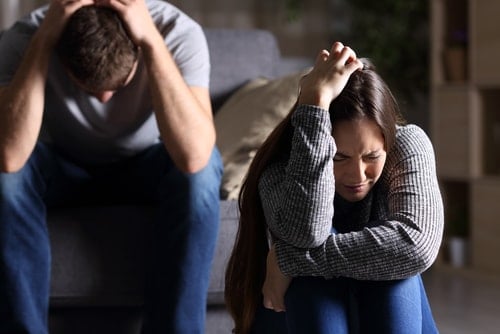Uncertainty is intimidating. It’s also a part of life, especially modern, stress-filled, fast-paced life. That is why we all need a safe place where we can find some much-needed consistency and reliability. For many of us, the safe place is a person with whom we have a romantic relationship, someone with whom we are comfortable sharing our innermost feelings, doubts, and insecurities.
But what happens when the sense of insecurity is overwhelming and turns into anxiety? What happens when the very place that you go to for stability turns into dangerous ground? Just when you thought that everything was going smoothly in your relationship, it feels as though you’re quickly losing ground. You are suddenly face-to-face with huge issues with relationship intimacy caused by your or your partner’s relationship anxiety.
Can your relationship survive in spite of it? How can you overcome this relationship challenge?
How Does Anxiety Affect Romantic Relationships?

Anxiety can take various forms, from social anxiety to dating and relationship anxiety. Left untreated, anxiety can take a toll on a person’s ability to form close relationships with others, including long-term romantic relationships.
Unresolved conflicts which may date all the way back to your childhood may affect your current and future relationships, especially if you shy away from broaching the topic directly and discussing it with your partner at length. When individuals with social or relationship anxiety are in a relationship with someone who triggers old wounds, they are more vulnerable to gaslighting and similar manipulative behaviors such as love bombing.
Signs You Or Your Partner May Suffer From Relationship Anxiety
It’s fairly simply to recognize the common symptoms of relationship anxiety:
- Having difficulty embarking on a new romantic relationship, pursuing a new relationship or lasting in a relationship due to unresolved personal issues, worries or concerns
- Having extreme anxiety around physical and sexual intimacy
- Heavy reliance on the partner for reassurance and inability to overcome anxious thoughts independently
- Constant fear of conflict and passivity in situations that require assertiveness, such as having serious conversations with the partner
- Constant fear of rejection and abandonment
- Experiencing overwhelming anxiety when the partner is absent
- Unjustified suspicions of the partner’s infidelity
- Tendency to sabotage the relationship
- Tendency to doubt long-term compatibility with the partner
- Fears that the partner may want to leave them
- Doubting the partner’s feelings and intentions
What Is It Like Dating Someone With Anxiety?
Doubt and confusion do not belong in a meaningful romantic relationship. Yet they manage to find their way into one, especially if one of the partners suffers from anxiety.
Having anxiety is like having a nervous feeling in your stomach (something like butterflies, but not the good kind) that hardly ever goes away. It’s hard to cope with it even if you’ve been living with it all your adult life.
You want the romance to work but you’re filled with a growing sense of dissatisfaction and frustration because you cannot wrap your head around your partner’s anxiety and its effect on your relationship.
Here’s the thing: your partner’s anxiety is not something you can or should try to fix. What you can do is learn to recognize the most effective methods to deal with their anxiety and show empathy, understanding, and support.
You also need to understand the hardships that frequently go hand in hand with relationship anxiety:
- Emotional distress and exhaustion
- Fatigue, lethargy, and lack of motivation
- Stomach upset and other physical manifestations
Why Does Dating Give Me Anxiety?
If you have ever been shunned by another person in any other meaningful relationship in your life, you may be anxious to date, let alone start a new relationship. You may fear abandonment or fret over the possibility that someone may judge you or, worse yet, get to know you and not like what they see.
Relationship anxiety is often caused by unpleasant experiences with past partners, including dishonesty regarding their feelings toward you, infidelity, being misleading regarding the nature and future of the relationship, as well as if they ended things abruptly and without closure.
Understand that anxiety is a type of emotional baggage that you are bringing into a relationship, but that it does not define you. Learn to love yourself for who you are and seek professional help such as emotional intimacy coaching so you can learn to manage your dating and relationship anxiety.
How Do I Calm My Partner’s Anxiety?
The most effective method to help calm your partner’s anxiety is to address the problem in a frank, straightforward way. Another person’s anxiety is not something you are responsible for fixing, but you can help them get help and become proactive about overcoming it.
Understand that your partner may doubt your feelings for them not because of your actions but because of their condition. Try to provide them with reassurance that you are in it for the long haul, not only while the going’s good.
What Should You Not Do When Dating Someone With Anxiety?
Anxiety is an increasingly common disorder. The potential causes include:
- Genetic predisposition
- Personality traits
- Emotional baggage
- Underlying medical conditions
- Underlying mental health disorders
- Substance abuse
Here’s what not to do when dating someone who suffers from anxiety:
- Do not assume that some light research on the internet will help you learn all there is to know about anxiety, as each individual with anxiety has specific triggers, symptoms, concerns, and issues: their experience of their own anxiety is unique and it will take time for you to understand what they’re going through.
- Do not assume that their anxiety is about you and do not force them to share what caused it. It may take time for your partner to become comfortable enough to share what gives them anxiety.
- Do not become overwhelmed by your partner’s stressors. You need to maintain strong social and emotional support systems of your own while being there for your partner, all the more so if you suffer from anxiety too. You are not their therapist.
How Do I Talk To My Partner About Anxiety?
Whether it’s you or your partner who suffers from anxiety, you mustn’t let the condition become the white elephant in the room. Discuss the condition and its repercussions openly:
In the majority of cases, your partner will experience constant insecurity and self-doubt. It is a burden they carry. What you can do is be understanding. Encourage them to seek help without contributing to their sense of guilt.
You deserve a partner who will understand your vulnerability and the debilitating effect of anxiety on your day-to-day life and your ability to function in a relationship. Do not discuss your condition openly with them from the get-go. Get to know them first. Remember: they are there to be supportive and help you manage your anxiety, not to fix the problem for you.
Can Anxiety Ruin A Relationship?
All mental health issues have the potential to ruin our relationships, and anxiety is no exception. Anxiety can have a serious impact on all our relationships: personal, social, romantic and professional ones.
In fact, anxiety can make forming a relationship a nearly impossible feat. The person is overwhelmed with a sense of isolation and a sense of dread at the very prospect of meeting new people, let alone finding a partner for a meaningful relationship.
A high level of anxiety combined with low tolerance to frustration can have a devastating effect on a romantic relationship. For one thing, the person with anxiety may constantly worry that their erratic behavior could drive the other person away. Whether this fear is irrational or not may not be relevant. As a result, they may decide to end things themselves just because they cannot bear the agony any longer.
The worst part of the problem is that it may take years and years for a person to admit they have a problem with anxiety and seek professional help because of it. Some people struggle with it their whole lives without ever seeking help or learning to overcome the condition. Although anxiety can be managed and kept under control, it often becomes so prevalent that the person affected feels powerless to stop the condition from running their life.
Helpful Strategies To Address Relationship Anxiety
If you’re in a loving relationship with a partner suffering from any form of anxiety, employ the following strategies to safeguard your relationship against its potentially detrimental effects:
- Learn what you’re up against
- Be patient and focus on listening to your partner
- Anxiety can be debilitating: exercise empathy
- Explore the potential triggers
- Do not take it personally
- Anxiety can be transferred: learn to mitigate your own
- Do not accept the role of the therapist
Join Our Emotional Intimacy Coaching & Restore Balance In Your Life & Relationship

Don’t let anxiety win and wreak havoc on your relationship. If you and your partner have a good thing going on, you need to fight for it and learn to overcome your emotional intimacy issues and relationship challenges together. It’s time to make your happiness and wellbeing a priority, and it all starts with reaching out to professionals for help and guidance.
We may not know what tomorrow may bring, but we do know how to help you overcome your anxiety-induced fears and concerns, and face the challenges in your relationship through individual coaching sessions or grow as a couple through our couple workshops.